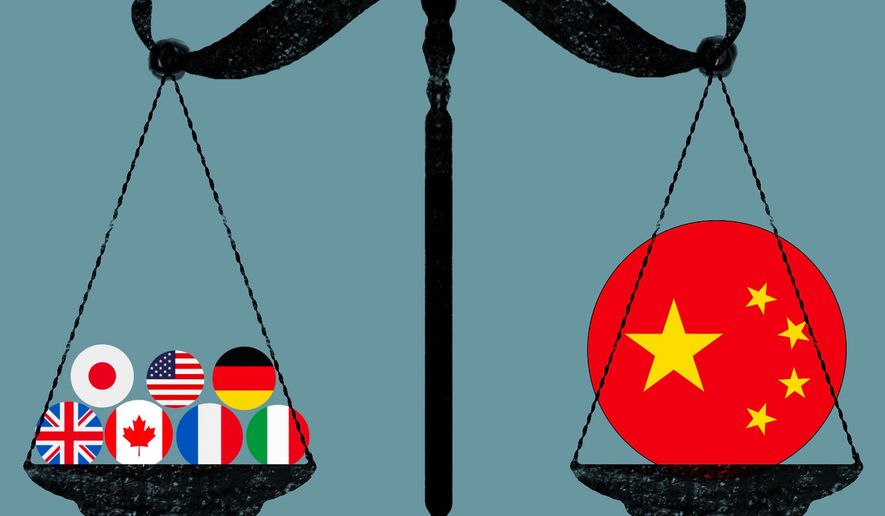Charles Hurt, Scott Walker
At the conclusion of its summit in Hiroshima, Japan, earlier this month, the Group of Seven issued a communique calling attention to China‘s “malign practices.” That prompted spokesmen for the Chinese Communist Party to complain about the G7‘s “Cold War mentality.”
Xi Jinping, the most powerful Chinese ruler since Mao Zedong, is building his military capabilities at breakneck speed. He formed a “no limits” alliance with Vladimir Putin days before Russian tanks invaded Ukraine.
He stripped Hong Kong of its freedoms in violation of Beijing’s treaty obligations. He persecutes Tibetans, Uyghurs and other minorities. He threatens Taiwan.
He steals billions of dollars in American intellectual property, inserts malware into the computer systems of critical U.S. infrastructure, flies spy balloons over American military bases, and helps traffic fentanyl into the U.S., resulting in the deaths of tens of thousands.
But he would have the world believe that it is the G7 — the U.S., Japan, Britain, Germany, France, Italy and Canada — that is bellicose.
President Biden last week wishfully predicted there will be a “thaw very shortly” in Sino-American relations. A spokeswoman for Beijing’s Foreign Ministry said that’s not happening so long as the U.S. is “resorting to any means to suppress and contain China.”
But how is China being suppressed and contained? The G7 communique stated: “Our policy approaches are not designed to harm China nor do we seek to thwart China’s economic progress and development.”
Nor has there been any serious effort to curtail Beijing’s growing influence in Africa, Latin America, Central Asia, the South Pacific and the Middle East.
Instead, the U.S. is becoming dependent on China for key components of a Washington-mandated-and-subsidized “fundamental transformation” of America’s energy sources. Why? To “address” — not impact — the “climate crisis.” (Was nothing learned from Germany’s disastrous decision to depend on Russian energy?)
The show of unity at the G7 notwithstanding, Mr. Xi hopes to divide the nations of Europe and Asia from the U.S. One useful wedge: “multipolarity,” a fantasy assiduously promoted by Beijing.
A little historical context: In World War II, the U.S. fought expansionist empires. After winning, the U.S. decided not to plant its flag in the soil of other nations, not to become a global ruler, but to attempt to become a global leader instead.
To that end, Americans organized what was hopefully called the United Nations. The Soviet Union, America’s hostile rival, was given a permanent seat and veto on the organization’s Security Council.
Americans promulgated an expanding list of “international laws” that the “international community” was to embrace, along with a Universal Declaration of Human Rights. (Not just global, but universal!)
What followed was an era of bipolarity. The Soviet Union wasn’t as strong as it appeared, but appearances count. And it was nuclear-armed.
The U.S. and the Soviet Union ran an arms race, and competed ideologically, economically and culturally. Because neither wanted the Cold War to turn hot, they fought with proxies.
Then one sunny day, the Soviet Union collapsed. Many otherwise smart people jumped to the conclusion that liberal values and freer markets would now be embraced globally (if not universally).
Toward this end, in 1998, during what was known as America’s “unipolar moment,” Russia was made a member of what became the G8. It remained in the club even after it sliced two swaths from neighboring Georgia in 2008. Only after Mr. Putin annexed Crimea in 2014 and invaded Ukraine last year was it expelled.
China was welcomed into the World Trade Organization in 2001. Slowly but surely, China has been taking over international organizations that American taxpayers largely fund. The World Health Organization is only the most visible example.
By now it should be apparent that when Mr. Xi talks of multipolarity, what he really envisions is a return to bipolarity — a competition that he is confident the CCP will win.
This is what he had in mind when he told Mr. Putin that the world is undergoing “changes that haven’t happened in 100 years.” It’s what he means when he talks of “the Chinese dream of great rejuvenation of the Chinese nation.”
Not all Americans oppose this eventuality. There are those on the left who insist America lacks the moral authority to lead. There are those on the right who believe maintaining American leadership in the world isn’t worth the trouble.
There are also those who believe that a multipolar world order would be preferable — fairer and more just. Couldn’t Europe be a pole? (No, because without the U.S., Europe is weak.) Couldn’t the global south be a pole? (No, because Latin American and African nations are not capable of organizing themselves effectively in the near future.)
What would happen instead, as Mr. Xi foresees, is that the loosey-goosey Pax Americana would be replaced by a strict and disciplined Pax Sinica. With the techno-totalitarian PRC as global hegemon, human rights and liberties would diminish everywhere — the United States emphatically included.
In this brave new world order, Beijing’s junior partners — Moscow, Tehran, Pyongyang and Havana — will do what they please; their weaker neighbors will suffer what they must.
“A growing China that plays by international rules would be of global interest,” the G7 communique plaintively declares. That must bring a smile to the face of a rock-ribbed Marxist/Leninist/Maoist like Mr. Xi.
If the leaders of the G7 recognized this reality, their top priority would be to increase their military and economic strength. No other policy can maintain deterrence and preserve freedom for the next generation. But they don’t recognize this reality. They lack the imagination to think as Mr. Xi thinks and see the future as Mr. Xi sees it.
• Clifford D. May is founder and president of the Foundation for Defense of Democracies (FDD) and a columnist for The Washington Times.

No comments:
Post a Comment